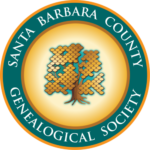Exhibit: Santa Barbara Asian American & Pacific Islander Heritage, 1870s-1970s
Riyokiu (Roke) Fukumura (1922- )
Devoted Caregiver, Athlete, Community Elder and Mentor, Fresh Produce Specialist
By Mary Hancock
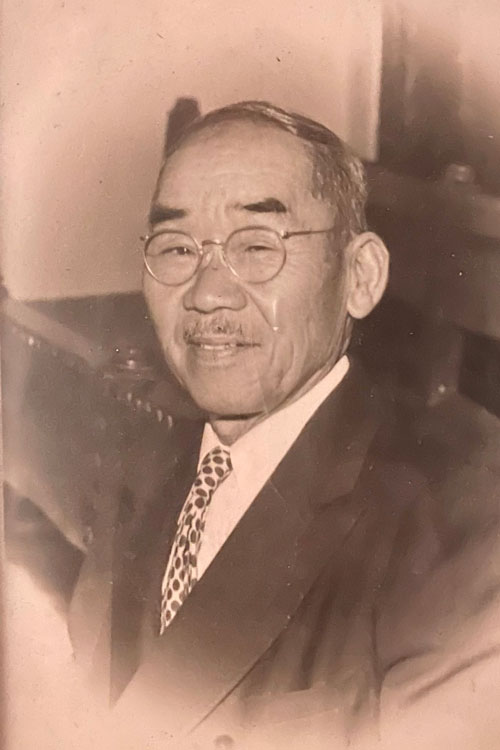
Kameki Fukumura (Courtesy of Kenneth Fujita)
Family History and Early Years
Roke’s father, Kameki Fukumura, was born in Kumamoto Prefecture in Japan and emigrated to the US in 1904, at the age of 23. His mother, Jima Takaki, was also born in Japan. Roke was the youngest of six children, the eldest of whom, Hatsume, was born in Japan; the others were Michiko, Emiko, Tomika and Tamio (Tom). Sadly, Jima died of pneumonia in March of 1928, at the age of 47, when Roke was just five years old. Kameki leased a 6-acre plot at 1919 Cliff Drive from 1922 to 1938, shifting to a 10-acre farm at 673 Grove Lane in 1938. The family raised a variety of fruits and vegetables for market, with the children helping out as Kameki weathered the challenges of the Great Depression.
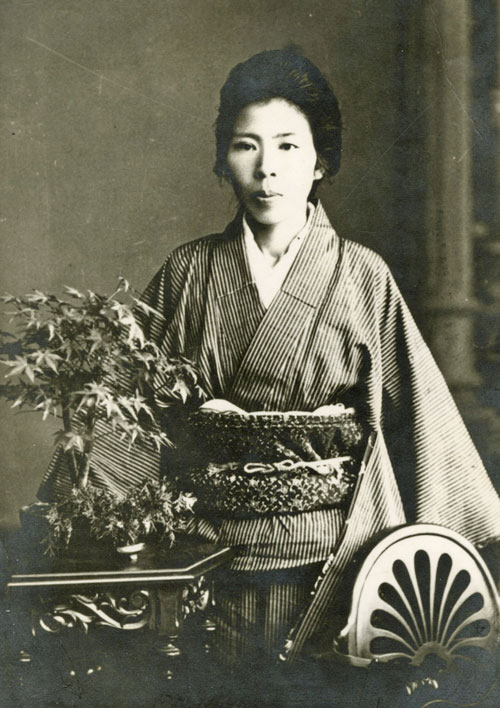
Jima Fukumura (Courtesy of Kenneth Fujita)
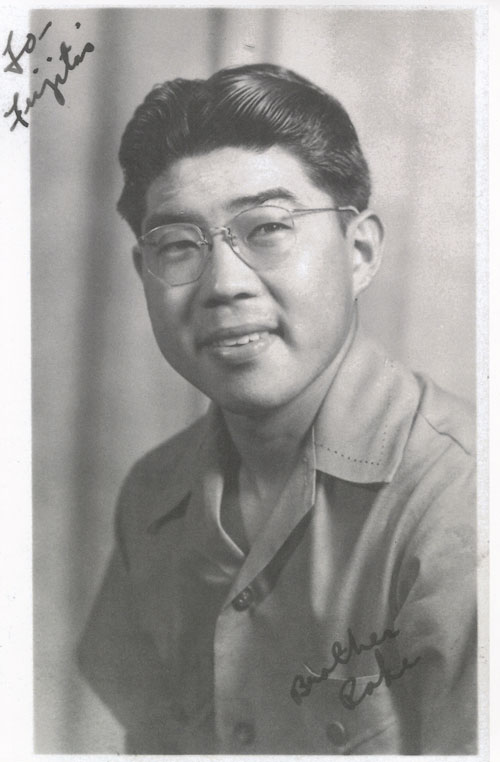
Riyokiu Fukumura Graduation Portrait (Courtesy of Kenneth Fujita)
Roke, born Riyokiu, earned his nickname in elementary school. His education began at Wilson Elementary and later McKinley Elementary. He went on to La Cumbre Junior High and graduated from Santa Barbara High School. He excelled in math and was a star athlete, setting the school record for the 50-yard dash, and playing shortstop for the Dons, the SBHS baseball team. In 1941, the Dons won the CIF Southern California Baseball Championship and, while still in high school, he was recruited to join Santa Barbara’s semi-pro Hi-Stars.
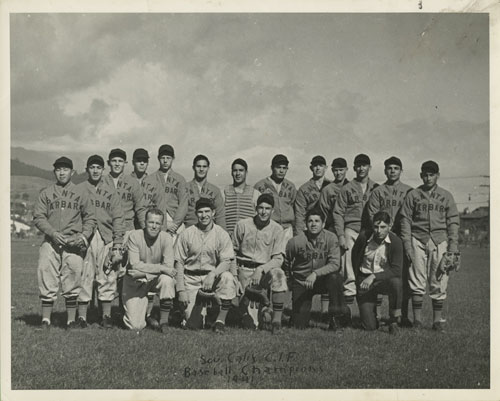
CIF Team Photograph, 1942 (Courtesy of Kenneth Fujita)
World War II and Detention
Further education was curtailed by World War II, during which time the family spent three years in detention near Poston, Arizona. Roke remembers learning of the attack on Pearl Harbor while working in the fields.”We were packing tomatoes and heard on the radio about Pearl Harbor. I thought, ‘Oh no, this was gonna be bad.’” The family, including Roke’s oldest sister, Michiko, and her new husband, Jimmy Fujita, moved first to Reedley, near Fresno, hoping that the inland location would allow them to avoid detention. In August 1942, however, they were ordered to relocate to Arizona. There they lived in barracks, crowded into two adjoining rooms, each 20’X25’. The family grew, with Roke’s sister, Michiko, giving birth to her son, Kenneth, in 1944. Roke worked in the dining commons first as a dishwasher and then as a cook. He and his brother, Tom (Tamio), found an outlet in sports, joining the Block 308 baseball team. Kameki developed a craft – samurai sword-making – using the limited materials available. In September 1945, Roke and his family were allowed to leave Poston and return to Santa Barbara. The family returned to the home on Grove Lane and, because their landlord had protected their possessions, were able to resume farming.
Career and Family
After the war, Roke farmed with his father and brothers in Santa Barbara and, briefly, in Fresno, but he soon found his niche in produce marketing. In 1950, Harry Bowman hired him to work in his wholesale produce market in Santa Barbara. When Tri-County Produce retail market was born from the wholesale business in 1966, Roke served as the store manager until 1972. Later, he worked as a buyer at the Santa Cruz Market (1972-75) and Jordano’s (1975-91). Not one to remain idle, after “retiring” from Jordano’s, he accepted Jim Dixon’s invitation to return to Tri-County Produce where he continued to work for another 31 years.
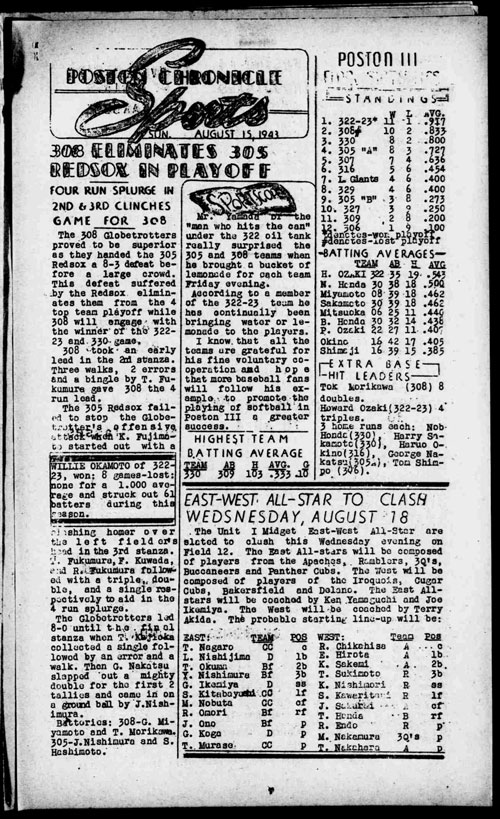
Poston Chronicle, August 1943 (Courtesy of “Chronicling America” Collection, Library of Congress)
In 1954, Roke was married at the First Congregational Church. Two years later, his first child, Ron, was born, followed in 1957 by his daughter, Sharon. He and his wife divorced a few years later, but Roke remained a devoted caregiver to his children and later his grandchildren. By the mid-1950s, the extended Fukumura-Fujita family had split into separate households, but they remained close-knit, gathering regularly for holidays, birthdays and other events. Ken Fujita, Roke’s nephew, recalls Thanksgiving meals at Tom’s place and Easter at Roke’s, adding, “Our favorite restaurant in the 50s was Nanking Garden, on Lower State. We knew the cooks, who always made our favorites—chow mein, pan fried noodles, oyster beef.”
Starting in the 1980s, Roke juggled his job as a produce buyer with caring for his grandchildren while his daughter, Sharon, built her floral business. And, in the early 2000s, Roke, became a caregiver for his elder sisters, Emiko, Tomika, and later Michiko, with whom he shared a home on Berkeley Road in Goleta. Despite personal losses that included the death of his friends Harry Bowman and Jim Dixon, and the sudden passing of his son, Ron, in 2022, Roke’s good humor, optimism and work ethic have never flagged.
Community Elder and Mentor
In the century since his birth, Roke has become a pillar of the community. While devoted to his family, Roke found time to play baseball and to mentor younger players. He has shared his life story and experience in detention in many public forums, helping younger generations remember those difficult days and learn from his resilience. As his nephew Ken Fujita notes, Roke truly embodies the qualities of his birth year, the Year of the Dog, as recorded in the Chinese lunar calendar: “He is loyal, generous, honest, works well with people, and is a dog-lover, too! All apply to him!”
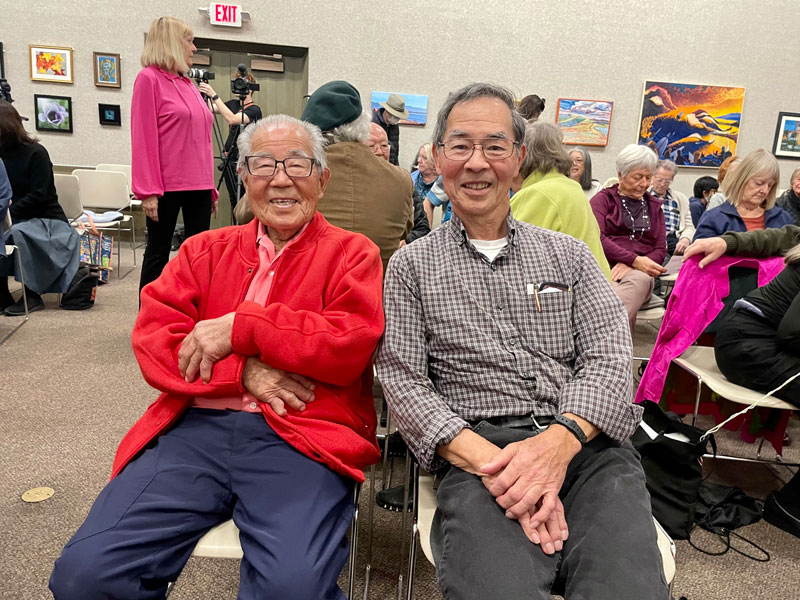
Roke Fukumura and nephew, Ken Fujita, February 2023, Faulkner Library, Santa Barbara. (Courtesy of Melinda Yamane Crawford)
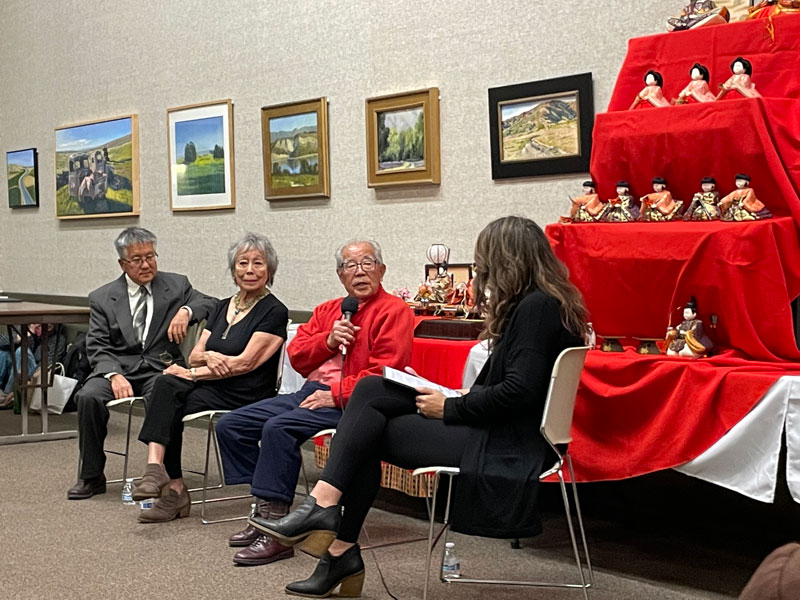
Panel on Japanese Internment, February 2023, Faulkner Library, Santa Barbara. (Courtesy of Melinda Yamane Crawford)
Acknowledgements
Warm thanks to Riyokiu Fukumura and Kenneth Fujita for sharing their stories and family photographs.
References
California, San Francisco Passenger Lists, 1893-1953, accessed through FamilySearch (https://familysearch.org/ark:/61903/1:1:QV1W-7739 : 19 February 2021), Kameki Fukumura, 1904; citing San Francisco, San Francisco, California, United States, NARA microfilm publication M1410 (Washington, D.C.: National Archives and Records Administration, n.d.); FHL microfilm 1,465,580.
“Celebrating A Hundred Years,” Tri-County Produce website, https://tcpsb.com/about/
Hayden, Tyler. “Century Man,” Santa Barbara Independent, December 22-29, 2022. Vol. 37, NO. 884, pp. 23-27
Ono. Gary. “More ‘Made-in-Camp‘ Samurai Swords Discovered,” Discover Nikkei, February 16, 2018. (www.discovernikkei.org/en/journal/2018/2/16/samurai-swords/)
Patton, Mark, “Roke Fukumura marks Major Milestone Just like Always with Humility and Humor” Nov. 27, 2022
https://www.noozhawk.com/mark_patton_roke_fukumura_marks_major_milestone_with_humility_20221127/
Poston Chronicle (1942-45)
“Unit 3 Spectators see Rookies Knock 308 out of Playoff” Poston Chronicle, Oct 31, 1942
“308 Eliminates 305 Red Sox in Playoff”, Poston Chronicle, August 15, 1943
“Camp III All-Start Win Inter-Unit Championship”, Poston Chronicle, May 30, 1945
[All issues of Poston Chronicle accessed through “Chronicling America.” Japanese-American Internment Camp Newspapers, 1942-1946. Library of Congress, Digital Collections.]
“Santa Barbara City,” US Census for 1920, 1930, 1940, 1950
“United States, War Relocation Authority centers, final accountability rosters, 1942-1946,” accessed through FamilySearch (https://www.familysearch.org/ark:/61903/1:1:684D-QYX7 : 15 December 2021), Kameki Fukumura, 4 Aug 1942; citing roster, family no. , line , NARA microfilm publication M1865 (Washington D.C.: National Archives and Records Administration, 2001).
